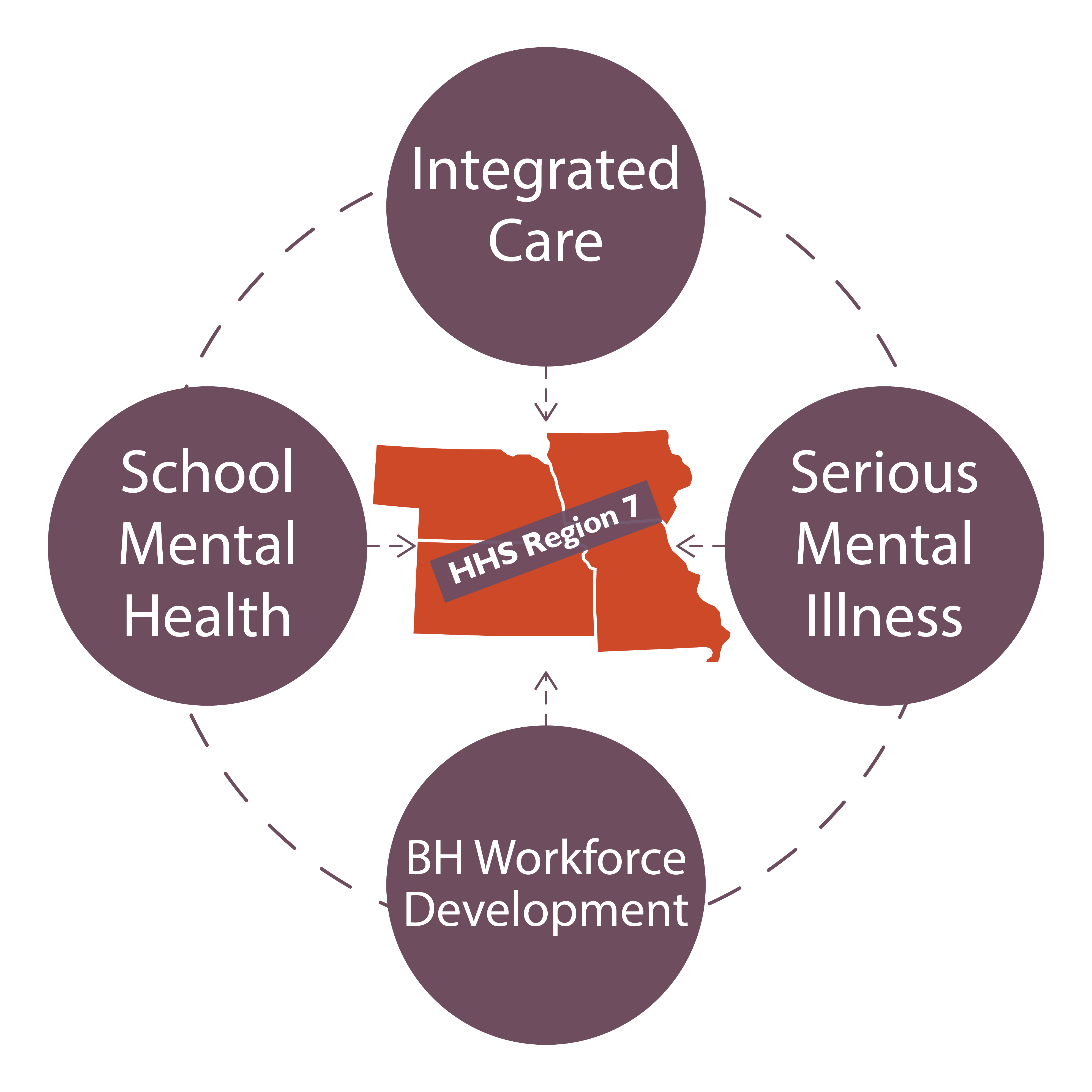
The Mid-America MHTTC offers technical training and assistance in four specialized training areas. Training is delivered through on-site workshops, conference presentations, webinars, and courses that can be taken live or through distance learning platforms. For more information about training, please visit our Access MHTTC Services page.
Integration of Behavioral Health in Primary Care
Integrated health care is our Center's primary area of focus. Access to behavioral health services is problematic for many children, adults and families, particularly in rural and underserved inner-city areas, where appointments can take two to six months to see a mental health provider. Consequently, many individuals initially seek help from their physicians (family medicine practitioner, pediatrician, or internist) for behavioral/mental health concerns, even though many of these primary care physicians report being uncomfortable and ill-prepared to address many of these behavioral presenting problems. As an alternative to referral to community providers, there is currently a national movement towards the integration of behavioral health into primary care medical practices, creating a “medical home” for patients in which their physical and behavioral health needs can be collaboratively addressed. Our Center frequently provides training and technical assistance in integrated care in the form of webinars, conference presentations, and direct consultations.
Read More About Our Area of Focus
Current & Upcoming Training Opportunities
School Mental Health
- A national priority, designated funds allocated via a $500,000 supplemental MHTTC grant
- 20% of children/youth have a need for mental health services but only one-third receive help
- Over 75% of mental health disorders begin in childhood
- Training and technical assistance focuses on implementation of comprehensive school mental health programming for school personnel, community practitioners, administrators, and state leaders
Training and Consultation
- Training for personnel from school districts or individual schools
- Needs and resource assessments
- Training on implementation of programming
- Prevention and Intervention
- Financing and sustaining programming
- Training for community providers contracted to provide school services
- Educational law
- Family, School, & Community Partnerships
- Coaching/consultation services
Download a PDF of School Mental Health Resources
Current & Upcoming Training Opportunities
National School Mental Health Curriculum Train-the-Trainers Modules
Serious Mental Illness
- People with serious mental illness experience difficulty in living meaningful inclusive lives
- Evidence-based practices exist to address
- Unemployment
- Homelessness
- Marginalization from friends and family
- Involvement with the criminal justice system
- Co-occurring substance abuse and medical illness
- Training and Consultation
Training and ongoing consultation in evidence-based practices are available for:
- Supported Employment
- Assertive Community Treatment
- Illness Management and Recovery
- Integrated Treatment for Co-occurring Disorders
- Peer Support Services
- Clinical Supervision
- Self-care for the Workforce
- Permanent Supportive Housing
- Development of Independent Living Skills, Coping Skills and Social Skills
- Motivational Interviewing
Download a PDF of Serious Mental Illness Resources
Current & Upcoming Training Opportunities
Behavioral Health Workforce Development
- 85% of counties in Missouri, Iowa, Nebraska, and Kansas have been federally identified as Mental Health Professions Shortage Areas
- Rural areas particularly face shortages of psychiatrists, APRNs, counselors, certified/licensed addiction counselors, psychologists, social workers, marriage and family therapists, psychiatric nurses, and unlicensed direct care workers.
Training and technical assistance are available to academic institutions, provider organizations, and schools to:
- Attract,
- Recruit,
- Place and Train
- Retain behavioral health providers
Specialized Training and Technical Assistance Available
- Legislative advocacy
- Ambassador (career development) programs
- Workforce grant writing
- Engagement of behavioral health education/training programs
- Consumer involvement
- Behavioral Health Professional Tracking Program
- Development of promotional materials
- Training in best practices to retain the workforce
- Graduate school recruitment to attract trainees to underserved population practice
- Health professions schools training to attract medical, nursing, and allied health students to MH
- Training in best practices to retain MH professionals in practice
Behavioral Health Education Center of Nebraska
